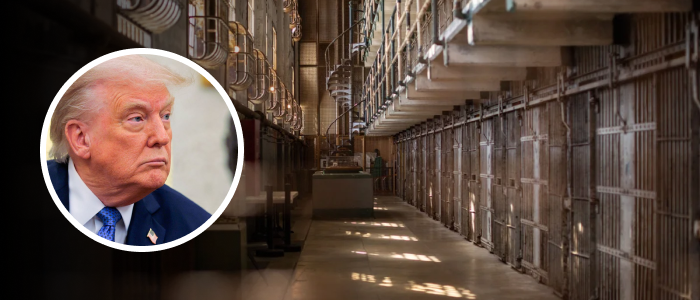“How can I be under arrest? And in this manner?” Franz Kafka’s famous fictional character, Josef K, asks the two men who show up at his apartment early one morning. “We don’t answer such questions,” the men tell him. “You’re going to have to answer them,” K responds.
“Here are my papers, now show me yours, starting with the arrest warrant.” Actually the two agents who have arrived at his door to take him away do not have to answer. And they don’t.

In “The Trial,” perhaps the most “Kafkaesque” of the celebrated Czech author’s early 20th-century novels, Josef K goes to his eventual death by execution without knowing how or why he got caught up in a bewildering bureaucratic nightmare. Neither does the reader. Kafka himself died a century ago, but in recent weeks he’s come back to life, so to speak.
For that, we can thank President Donald Trump and his plans to carry out mass deportation. Designed by White House advisor and anti-immigration zealot Stephen Miller and implemented by Trump’s border czar, Tom Holman, who prefers the brutalist approach to immigration-law enforcement. “I don’t care what the judges think, I don’t care,” Holman has said.
Due process, as far as this trio is concerned, is pretty much an afterthought. Consider a real-life Josef K, a Salvadoran native living in Baltimore, legally, who on March 12 fell into the clutches of Immigration and Customs Enforcement agents. On a Wednesday afternoon, Kilmar Armando Abrego Garcia, a sheet metal worker, left work as usual and drove to his mother-in-law’s house to pick up his 5-year-old son, an autistic child who has a hearing deficit and is unable to communicate effectively.
On the way home, an unmarked vehicle pulled Abrego Garcia over. According to court documents, men identifying themselves as ICE agents with Homeland Security Investigations told him his “status has changed.” Within minutes and without a warrant, he was handcuffed and detained in one of several ICE vehicles on the scene.
The agents gave him 10 minutes to call his wife to collect the mute and terrified little boy watching everything from the backseat. Otherwise, they told him, his son would be handed over to Child Protective Services. She arrived to find her husband distraught and in tears.
With no explanation for why or where he’d be taken, Abrego Garcia was promptly hauled away. Shuttled between detention centers from Maryland, to Louisiana to Texas, Abrego Garcia managed only a few disoriented calls to his wife, his confusion palpable. He was being accused of gang affiliations.
Both Abrego Garcia and his wife pleaded with ICE, explaining that he had fled gang threats as a teenager, earned U.S. protection and had already disproven baseless accusations of ties to MS-13, the notorious Salvadoran gang.
According to court filings, ICE repeatedly assured him he’d get his day in court. Then, from a detention center in La Villa, Texas, came Abrego Garcia’s final, urgent call. He was being sent to El Salvador, to “CECOT,” he told his wife.
The next day, a news photo showed men kneeling, heads shaved, arms locked overhead — faces hidden. But she recognized those scars, those tattoos. There was her husband.
Exiled to a hellish megaprison for terrorists, shoulder-to-shoulder with the “ worst of the worst ” in the country he’d worked so hard to escape. Three days after Abrego Garcia’s arrest, the federal government admitted that he had been imprisoned by mistake. It was “an administrative error,” an ICE official conceded, relying on the type of bloodless phrase perennially favored by faceless, “bootlick bureaucrats,” to borrow Timothy Synder’s description in his book “On Freedom.
” Too bad about that administrative error. In a cruel twist, attorneys for the government told Abrego Garcia’s wife and her own attorneys there’s nothing they can do to free him, now that he’s in Salvadoran custody. Trump’s “primacy in foreign affairs” — whatever that means — is more important than Abrego Garcia’s family or his freedom, Trump’s attorneys argued.
If the government — our government — prevails, the man could be in the Salvadoran hellhole for the rest of his life. Abrego Garcia has no criminal record, has no known connections to a gang and checked in with ICE regularly as part of his protected status. His wife and child are both U.
S. citizens. As Abrego Garcia’s attorneys, in their filing, put it: their client “sits in a foreign prison solely at the behest of the United States, as the product of a Kafkaesque mistake.
” He ended up behind bars, even after a U.S. district judge told the Trump administration to halt flights of detainees to El Salvador, an order the administration ignored.
El Salvador’s President Nayib Bukele, a Trump acolyte, offered up a callous response on social media: “Oopsie...
Too late.” Abrego Garcia is not the only one victimized by the misrule of law. There is also Rumeysa Ozturk, a student jailed for writing a pro-Palestine op-ed; Dr.
Rasha Alaweigh, deported despite a court order; and Mahmoud Khalil, a green card holder who remains detained without evidence. Both Ozturk and Khalil were surrounded by a pack of plainclothes agents, like wolves moving in for the takedown. Both were denied the privilege of an explanation as they were handcuffed and taken away in an unmarked car.
“Unlike with other categories of immigrants,” Adam Serwer writes in The Atlantic, “revoking the status of legal permanent residents generally requires evidence of wrongdoing.” “Generally” is not an apt description of life in the U.S.
these days (in all sorts of ways), as New York Times columnist and Russian emigre M. Gessen suggests. “Those of us who have lived in countries terrorized by a secret police force can’t shake a feeling of dreadful familiarity,” Gessen writes.
Gessen knows the fear of unmarked SUVs, the knock that shatters all peace, the shadow of secret lists. Now, fellow Americans are learning it too. Plainclothes agents circle churches, schools and hospitals like vultures.
ICE turns neighbor against neighbor, encouraging suspicion and snitching. People feel it — the unease, the panic — when they check in at an airport, knowing they’re at the mercy of a bureaucrat obeying an executive order. They cautiously eye the green-striped Border Patrol vehicle that pulls up at the gas station where they’re filling up.
(Sure, my papers are in order, but what if I can’t prove it? Do I end up in a Salvadoran prison?) Literature, like history, is replete with warnings about human nature and our inclination, if given the opportunity, to wield unchecked power mercilessly. Machiavelli, Orwell, Solzhenitsyn and, of course, Kafka — they all saw it. So did the Founding Fathers, who built constitutional guardrails to stop tyrants, real or aspiring.
They anchored us to the rule of law, not the rule of a future Trump and his 100-plus (and counting) executive orders, or the world’s richest man or some concoction called DOGE. Trump and company, either ignorant of the Constitution or disdainful, have smashed guardrails. They don’t care that due process is an essential building block of democracy and that without it, it’s not only a foreign-born resident like Khalil who can be deprived of life or liberty.
It’s also the rest of us. With its mass-deportation crusade, the Trump administration is following a well-worn path. “Leaders who aspire to absolute power always begin by demonizing groups that lack the political power to resist and that might be awkward for the political opposition to defend,” Serwer of The Atlantic points out.
Label them criminals or deviants or outcasts or traitors, and they become convenient scapegoats. (Server notes that the label “traitor” is a favorite of Musk and the president he serves alongside.) U.
S. district court judges in Washington and Maryland attempted to resist our tumble into a Kafkaesque nightmare. On Monday, however, the Supreme Court ruled that Trump can go ahead with deporting Venezuelan immigrants under the 18th-century Alien Enemies Act.
At least the justices decided that the men can challenge their deportations in court. But only in Texas, where they were last detained. It just so happens federal courts here are under the jurisdiction of the 5th U.
S. Circuit Court of Appeals, which is so far to the right that their rulings exasperate even the conservative majority on the Supreme Court. A federal judge in Brownsville has moved to block the removal of any Venezuelans held at the El Valle Detention Center In a separate decision, Chief Justice John Roberts paused a lower court ruling that would have required the Trump administration to bring Abrego Garcia back to the U.
S. The justices need time to ponder the maddening legal loophole the White House created by violating court orders and sending an individual to a foreign prison outside the court’s jurisdiction. The father will have to wait in prison while they think.
Evidently, saving the rule of law desperately requires not just the courts, but also the attention of Congress. Its Trump-compliant members still sleep. That leaves the most important citadel of resistance: the people themselves.
Fortunately, Americans seem to be shaking off a stunned period of post-election hibernation in protests, town halls, election booths and financial markets. Although Kafka’s hapless Josef K could not control his fate, we the people still can..
Politics

OUTSIDE VIEW: Why won’t the US act to bring back legal immigrant mistakenly sent to El Salvador prison?

“How can I be under arrest? And in this manner?” Franz Kafka’s famous fictional character, Josef K, asks the two men who show up at his apartment early one morning.















